Abstract
The site of action of aminoglutethimide (AG) has been investigated. An initial study was performed on 10 postmenopausal patients with advanced breast cancer who had taken 1000 mg AG per day and 20 mg hydrocortisone (HC) twice daily (b.d.) for greater than 3 months. There was a 15.5 +/- 5.6 s.e.-fold rise in 17-OH progesterone and a 4.9 +/- 0.9 s.e.-fold rise in 4 delta androstenedione but no rise in cortisol or oestrone 30 min after short Synacthen tests. These results suggested that peripheral aromatisation was a more important site of AG action than adrenal desmolase, and that adrenal 11 beta hydroxylase was inhibited. Since aromatase is more sensitive than desmolase to AG in vitro, lower doses of AG alone (i.e. without HC) were assessed for endocrine effects in 13 further post-menopausal women with advanced breast cancer. All of these patients tolerated 125 mg AG b.d., but 3 could not tolerate the conventional maximum dose. Oestrone levels on 125 mg AG b.d. were suppressed below pretreatment levels and were not significantly different from those on 500 mg AG b.d. alone, or with the addition of HC. Oestradiol levels were suppressed to a similar extent. Dehydroepiandrosterone sulphate (DHA-S) levels were not suppressed by AG alone, but fell on addition of HC. The endocrine results show low dose AG alone is an effective and well tolerated inhibitor of the peripheral production of oestrogens in postmenopausal patients. Therapeutic trials are now possible. DHA-S is not a marker of AG effect.
Full text
PDF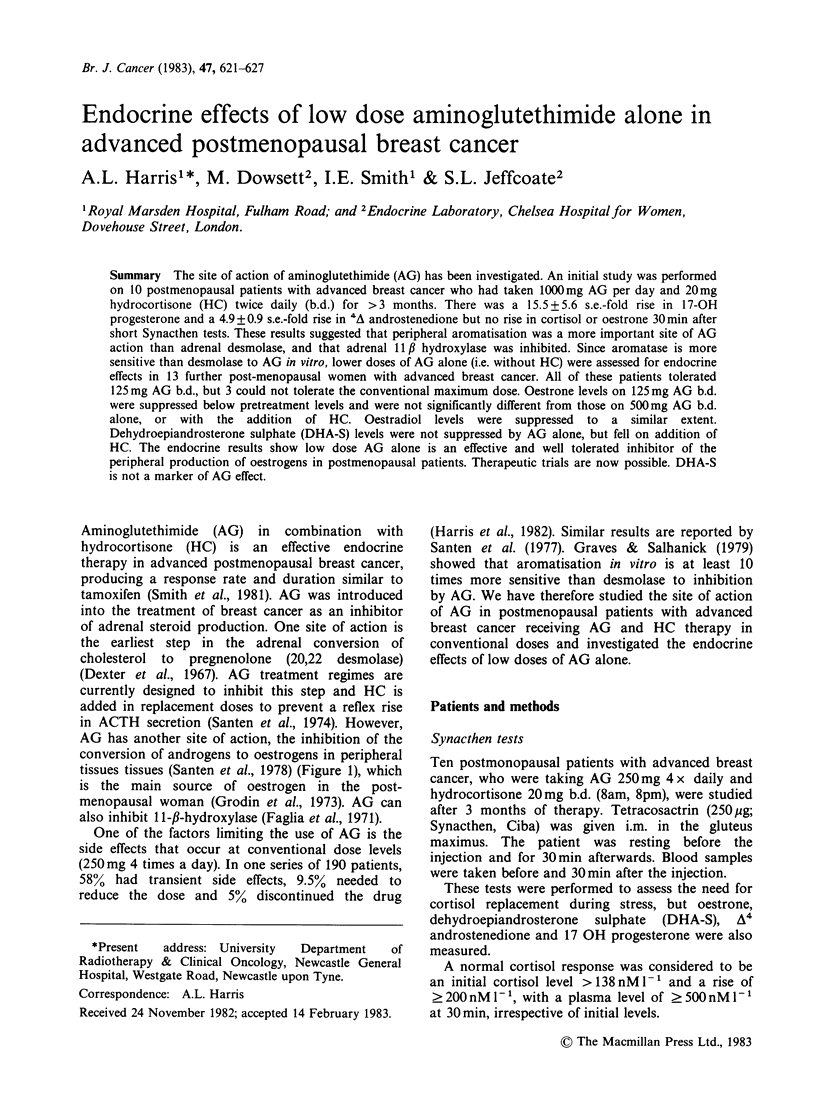
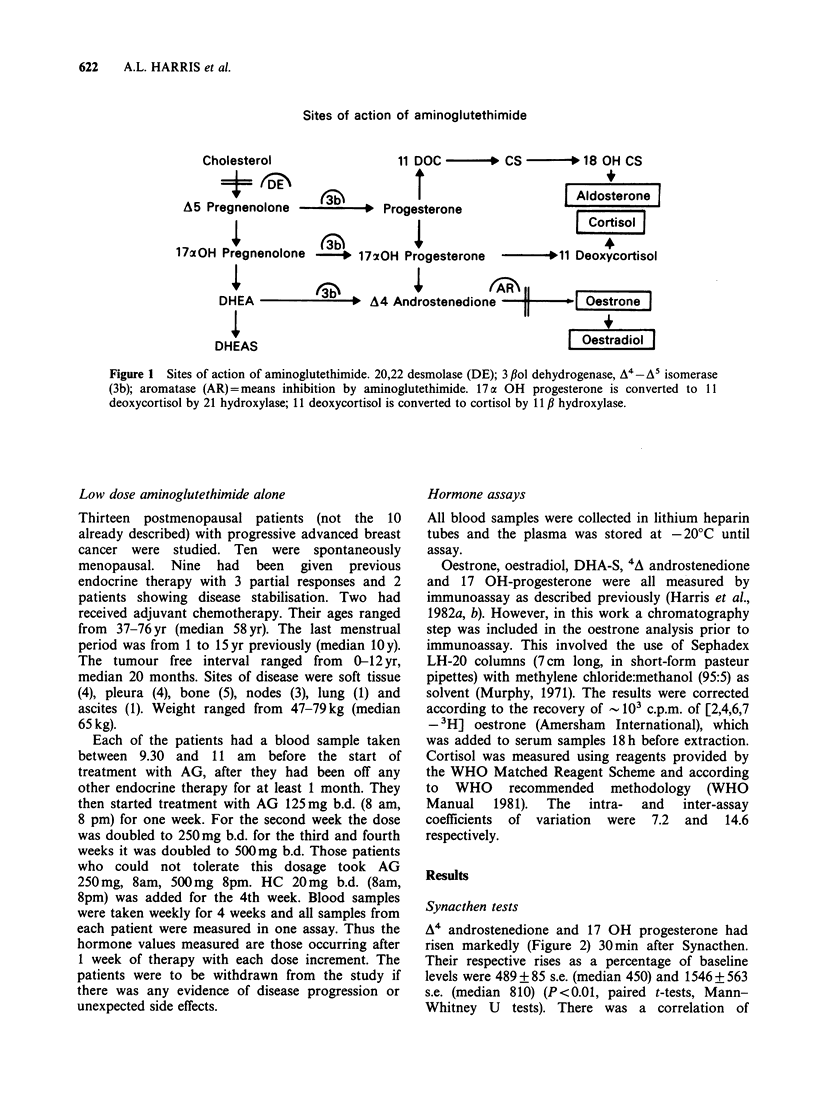
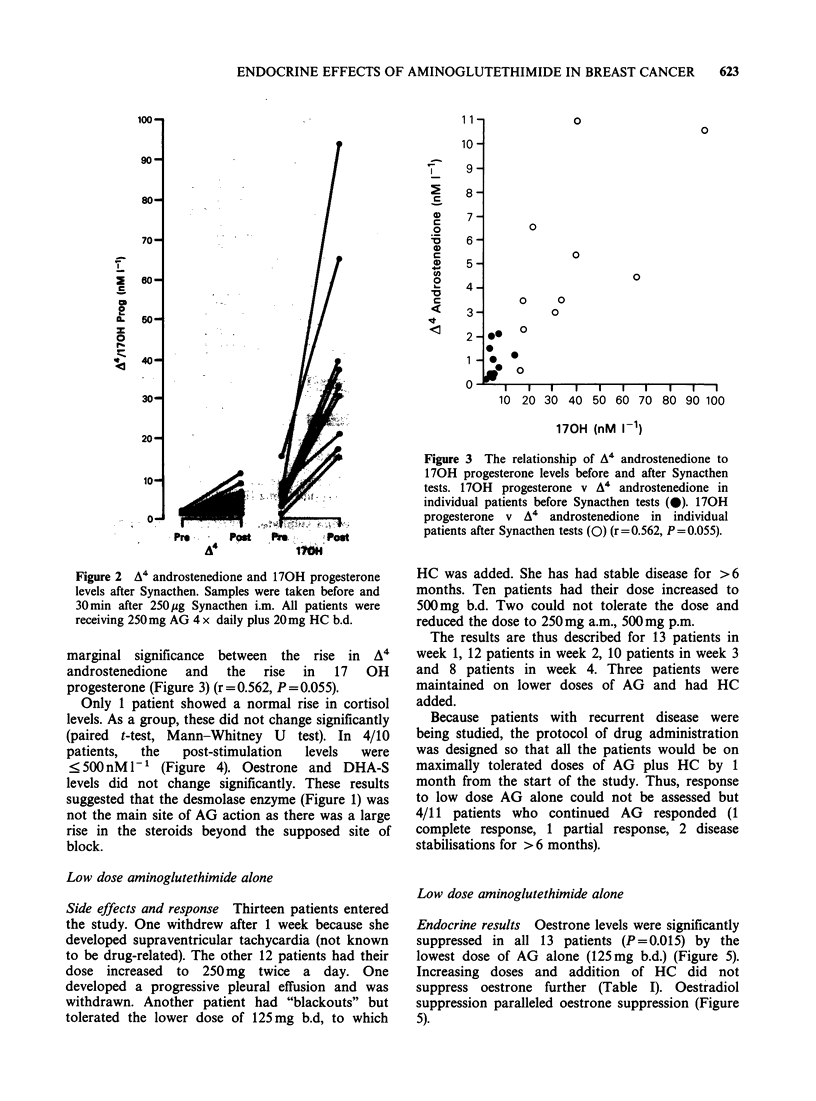
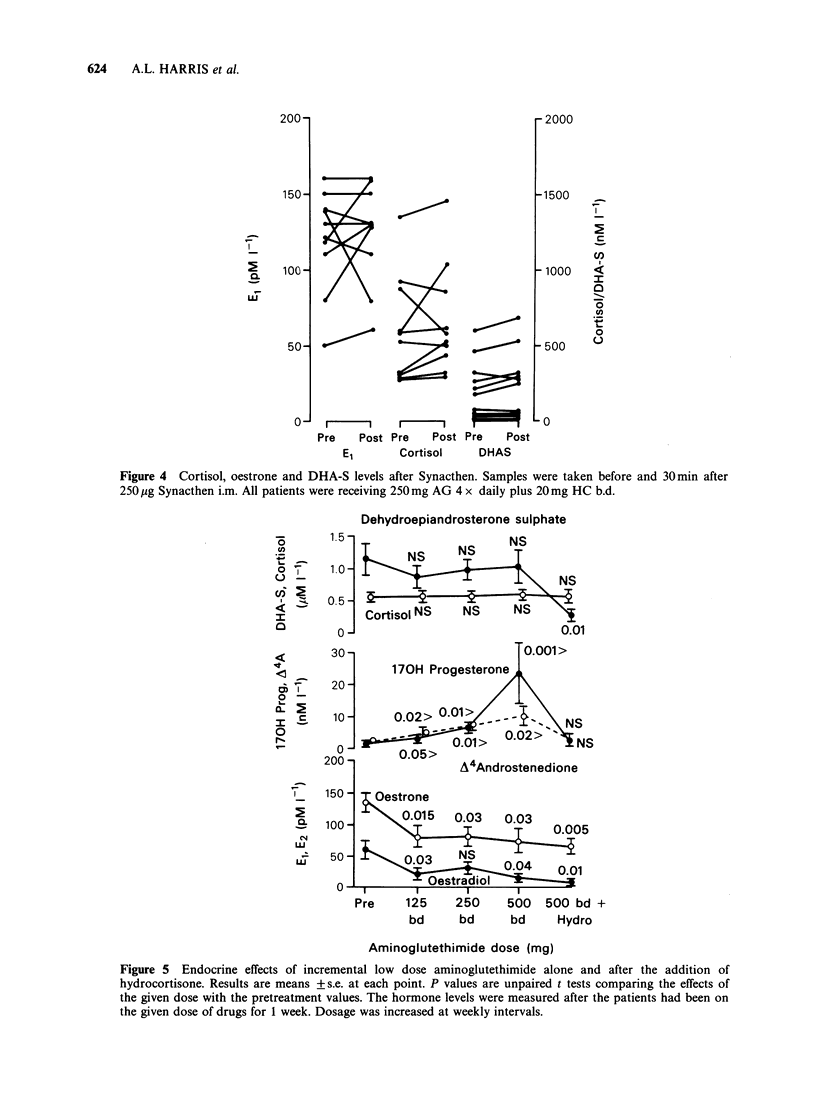
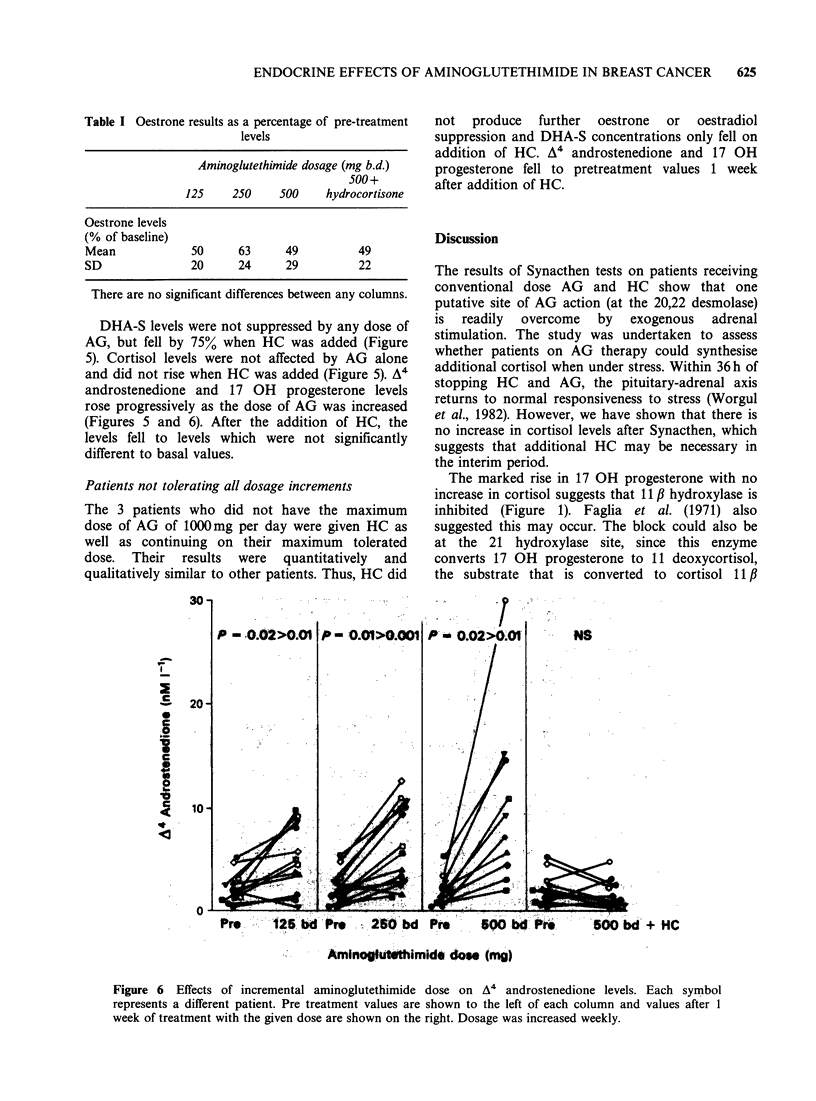
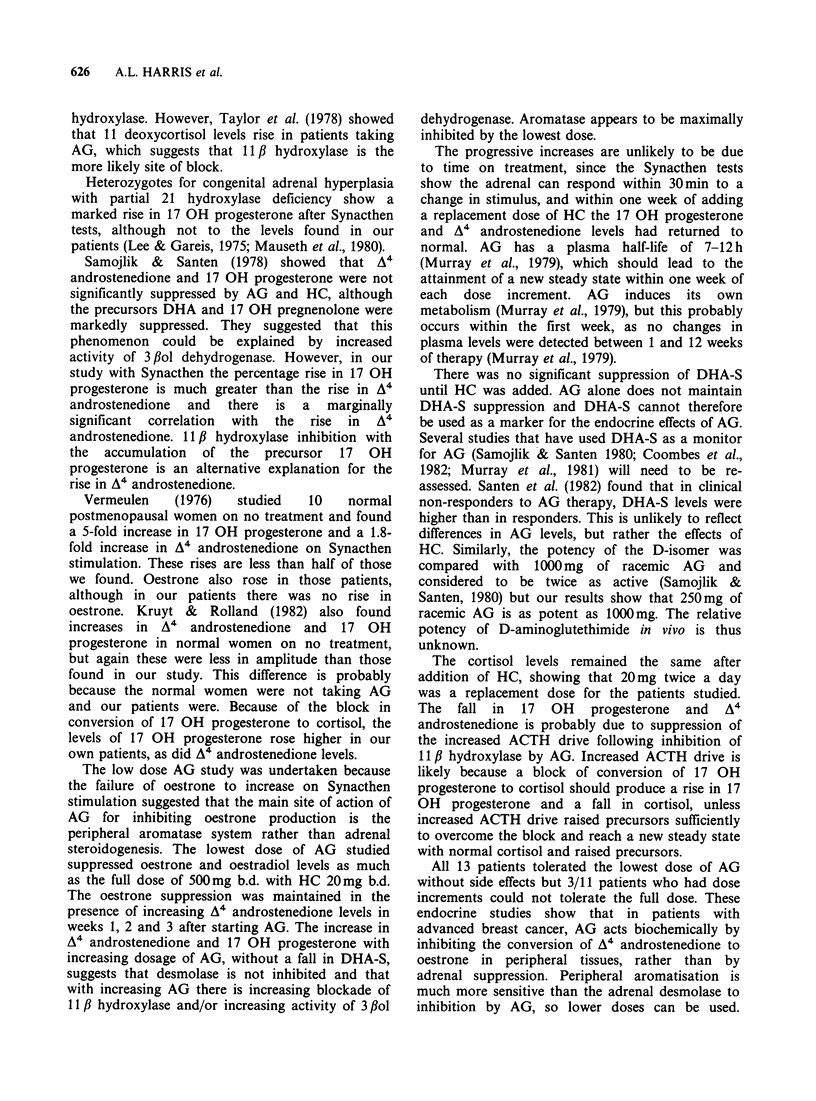
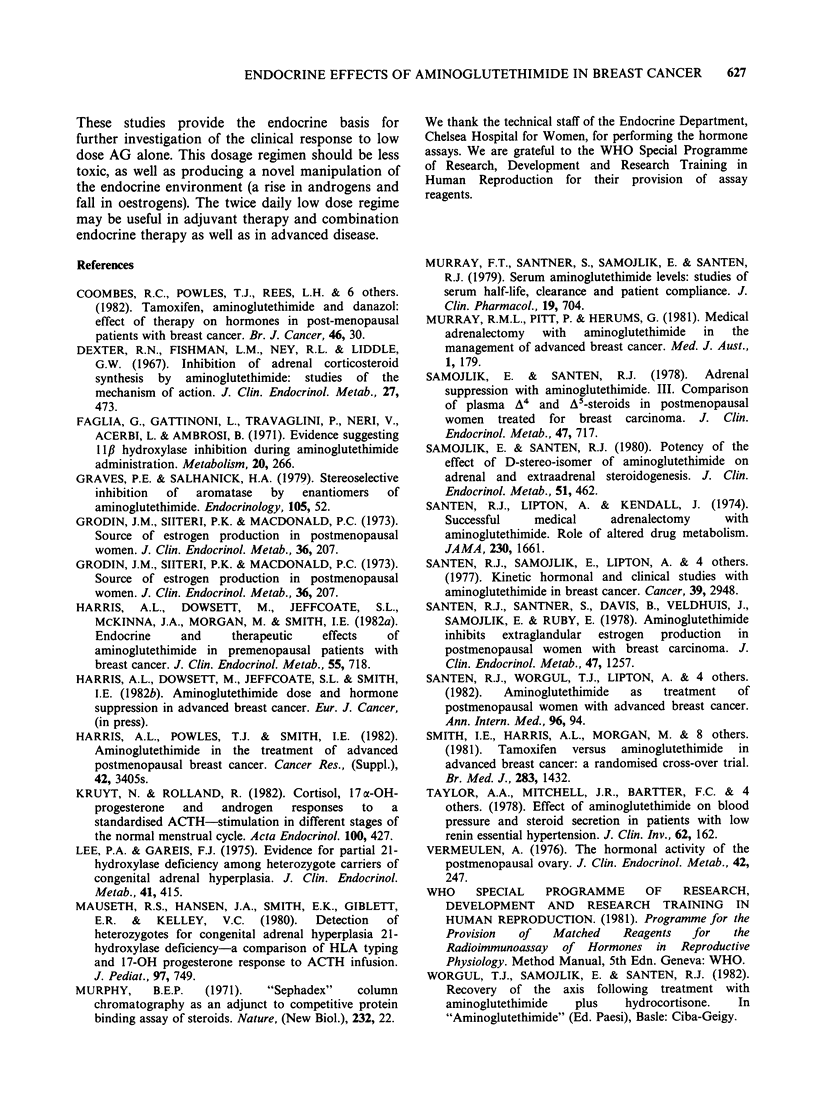
Selected References
These references are in PubMed. This may not be the complete list of references from this article.
- Dexter R. N., Fishman L. M., Ney R. L., Liddle G. W. Inhibition of adrenal corticosteroid synthesis by aminoglutethimide: studies of the mechanism of action. J Clin Endocrinol Metab. 1967 Apr;27(4):473–480. doi: 10.1210/jcem-27-4-473. [DOI] [PubMed] [Google Scholar]
- Faglia G., Gattinoni L., Travaglini P., Neri V., Acerbi L., Ambrosi B. Evidence suggesting 11 beta-hydroxylase inhibition during aminoglutethimide administration. Metabolism. 1971 Mar;20(3):266–272. doi: 10.1016/0026-0495(71)90109-0. [DOI] [PubMed] [Google Scholar]
- Graves P. E., Salhanick H. A. Stereoselective inhibition of aromatase by enantiomers of aminoglutethimide. Endocrinology. 1979 Jul;105(1):52–57. doi: 10.1210/endo-105-1-52. [DOI] [PubMed] [Google Scholar]
- Grodin J. M., Siiteri P. K., MacDonald P. C. Source of estrogen production in postmenopausal women. J Clin Endocrinol Metab. 1973 Feb;36(2):207–214. doi: 10.1210/jcem-36-2-207. [DOI] [PubMed] [Google Scholar]
- Harris A. L., Dowsett M., Jeffcoate S. L., McKinna J. A., Morgan M., Smith I. E. Endocrine and therapeutic effects of aminoglutethimide in premenopausal patients with breast cancer. J Clin Endocrinol Metab. 1982 Oct;55(4):718–722. doi: 10.1210/jcem-55-4-718. [DOI] [PubMed] [Google Scholar]
- Harris A. L., Powles T. J., Smith I. E. Aminoglutethimide in the treatment of advanced postmenopausal breast cancer. Cancer Res. 1982 Aug;42(8 Suppl):3405s–3408s. [PubMed] [Google Scholar]
- Kruyt N., Rolland R. Cortisol, 17 alpha-OH, progesterone and androgen responses to a standardized ACTH-stimulation in different stages of the normal menstrual cycle. Acta Endocrinol (Copenh) 1982 Jul;100(3):427–433. doi: 10.1530/acta.0.1000427. [DOI] [PubMed] [Google Scholar]
- Lee P. A., Gareis J. F. Evidence for partial 21-hydroxylase deficiency among heterozygote carriers of congenital adrenal hyperplasia. J Clin Endocrinol Metab. 1975 Aug;41(2):415–418. doi: 10.1210/jcem-41-2-415. [DOI] [PubMed] [Google Scholar]
- Mauseth R. S., Hansen J. A., Smith E. K., Giblett E. R., Kelley V. C. Detection of heterozygotes for congenital adrenal hyperplasia: 21-hydroxylase deficiency-a comparison of HLA typing and 17-OH progesterone response to ACTH infusion. J Pediatr. 1980 Nov;97(5):749–753. doi: 10.1016/s0022-3476(80)80257-5. [DOI] [PubMed] [Google Scholar]
- Murray F. T., Santner S., Samojlik E., Santen R. J. Serum aminoglutethimide levels: studies of serum half-life, clearance, and patient compliance. J Clin Pharmacol. 1979 Nov-Dec;19(11-12):704–711. doi: 10.1002/j.1552-4604.1979.tb01640.x. [DOI] [PubMed] [Google Scholar]
- Murray R. M., Pitt P., Jerums G. Medical adrenalectomy with aminoglutethimide in the management of advanced breast cancer. Med J Aust. 1981 Feb 21;1(4):179–181. doi: 10.5694/j.1326-5377.1981.tb135442.x. [DOI] [PubMed] [Google Scholar]
- Samojlik E., Santen R. J. Adrenal suppression with aminoglutethimide. III. Comparison of plasma delta 4- and delta 5-steroids in postmenopausal women treated for breast carcinoma. J Clin Endocrinol Metab. 1978 Oct;47(4):717–724. doi: 10.1210/jcem-47-4-717. [DOI] [PubMed] [Google Scholar]
- Samojlik E., Santen R. J. Potency of the effect of D-stereoisomer of aminoglutethimide on adrenal and extraadrenal steroidogenesis. J Clin Endocrinol Metab. 1980 Sep;51(3):462–465. doi: 10.1210/jcem-51-3-462. [DOI] [PubMed] [Google Scholar]
- Santen R. J., Lipton A., Kendall J. Successful medical adrenalectomy with amino-glutethimide. Role of altered drug metabolism. JAMA. 1974 Dec 23;230(12):1661–1665. [PubMed] [Google Scholar]
- Santen R. J., Samojlik E., Lipton A., Harvey H., Ruby E. B., Wells S. A., Kendall J. Kinetic, hormonal and clinical studies with aminoglutethimide in breast cancer. Cancer. 1977 Jun;39(6 Suppl):2948–2958. doi: 10.1002/1097-0142(197706)39:6<2948::aid-cncr2820390681>3.0.co;2-9. [DOI] [PubMed] [Google Scholar]
- Santen R. J., Santner S., Davis B., Veldhuis J., Samojlik E., Ruby E. Aminoglutethimide inhibits extraglandular estrogen production in postmenopausal women with breast carcinoma. J Clin Endocrinol Metab. 1978 Dec;47(6):1257–1265. doi: 10.1210/jcem-47-6-1257. [DOI] [PubMed] [Google Scholar]
- Smith I. E., Harris A. L., Morgan M., Ford H. T., Gazet J. C., Harmer C. L., White H., Parsons C. A., Villardo A., Walsh G. Tamoxifen versus aminoglutethimide in advanced breast carcinoma: a randomized cross-over trial. Br Med J (Clin Res Ed) 1981 Nov 28;283(6304):1432–1434. doi: 10.1136/bmj.283.6304.1432. [DOI] [PMC free article] [PubMed] [Google Scholar]
- Taylor A. A., Mitchell J. R., Bartter F. C., Snodgrass W. R., McMurtry R. J., Gill J. R., Jr, Franklin R. B. Effect of aminoglutethimide on blood pressure and steroid secretion in patients with low renin essential hypertension. J Clin Invest. 1978 Jul;62(1):162–168. doi: 10.1172/JCI109101. [DOI] [PMC free article] [PubMed] [Google Scholar]
- Vermeulen A. The hormonal activity of the postmenopausal ovary. J Clin Endocrinol Metab. 1976 Feb;42(2):247–253. doi: 10.1210/jcem-42-2-247. [DOI] [PubMed] [Google Scholar]


